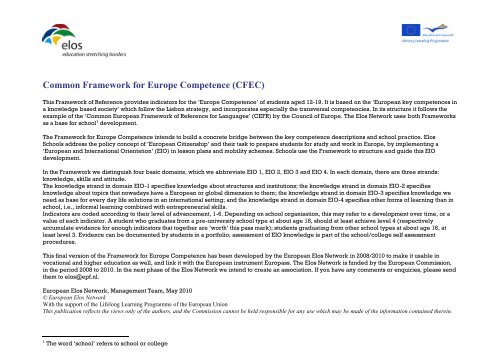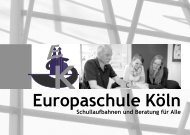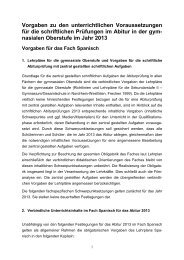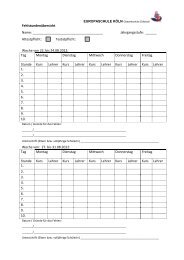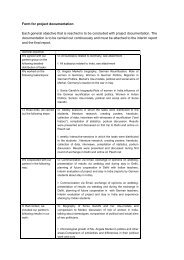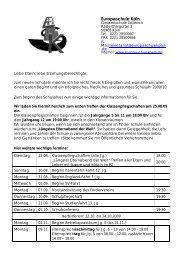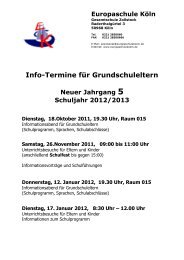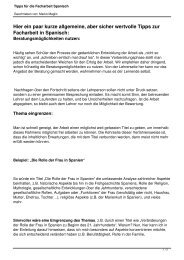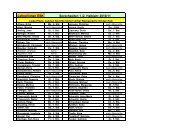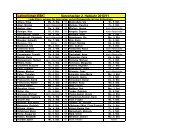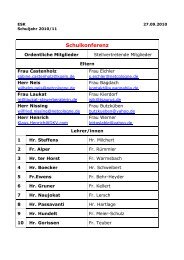Common Framework for Europe Competence (CFEC) - Eurocid
Common Framework for Europe Competence (CFEC) - Eurocid
Common Framework for Europe Competence (CFEC) - Eurocid
You also want an ePaper? Increase the reach of your titles
YUMPU automatically turns print PDFs into web optimized ePapers that Google loves.
<strong>Common</strong> <strong>Framework</strong> <strong>for</strong> <strong>Europe</strong> <strong>Competence</strong> (<strong>CFEC</strong>)<br />
This <strong>Framework</strong> of Reference provides indicators <strong>for</strong> the ‘<strong>Europe</strong> <strong>Competence</strong>’ of students aged 12-19. It is based on the ‘<strong>Europe</strong>an key competences in<br />
a knowledge based society’ which follow the Lisbon strategy, and incorporates especially the transversal competencies. In its structure it follows the<br />
example of the ‘<strong>Common</strong> <strong>Europe</strong>an <strong>Framework</strong> of Reference <strong>for</strong> Languages’ (CEFR) by the Council of <strong>Europe</strong>. The Elos Network uses both <strong>Framework</strong>s<br />
as a base <strong>for</strong> school 1 development.<br />
The <strong>Framework</strong> <strong>for</strong> <strong>Europe</strong> <strong>Competence</strong> intends to build a concrete bridge between the key competence descriptions and school practice. Elos<br />
Schools address the policy concept of ‘<strong>Europe</strong>an Citizenship’ and their task to prepare students <strong>for</strong> study and work in <strong>Europe</strong>, by implementing a<br />
‘<strong>Europe</strong>an and International Orientation’ (EIO) in lesson plans and mobility schemes. Schools use the <strong>Framework</strong> to structure and guide this EIO<br />
development.<br />
In the <strong>Framework</strong> we distinguish four basic domains, which we abbreviate EIO 1, EIO 2, EIO 3 and EIO 4. In each domain, there are three strands:<br />
knowledge, skills and attitude.<br />
The knowledge strand in domain EIO-1 specifies knowledge about structures and institutions; the knowledge strand in domain EIO-2 specifies<br />
knowledge about topics that nowadays have a <strong>Europe</strong>an or global dimension to them; the knowledge strand in domain EIO-3 specifies knowledge we<br />
need as base <strong>for</strong> every day life solutions in an international setting; and the knowledge strand in domain EIO-4 specifies other <strong>for</strong>ms of learning than in<br />
school, i.e., in<strong>for</strong>mal learning combined with entrepreneurial skills.<br />
Indicators are coded according to their level of advancement, 1-6. Depending on school organisation, this may refer to a development over time, or a<br />
value of each indicator. A student who graduates from a pre-university school type at about age 18, should at least achieve level 4 (respectively<br />
accumulate evidence <strong>for</strong> enough indicators that together are ‘worth’ this pass mark); students graduating from other school types at about age 16, at<br />
least level 3. Evidence can be documented by students in a portfolio; assessment of EIO knowledge is part of the school/college self assessment<br />
procedures.<br />
This final version of the <strong>Framework</strong> <strong>for</strong> <strong>Europe</strong> <strong>Competence</strong> has been developed by the <strong>Europe</strong>an Elos Network in 2008/2010 to make it usable in<br />
vocational and higher education as well, and link it with the <strong>Europe</strong>an instrument Europass. The Elos Network is funded by the <strong>Europe</strong>an Commission,<br />
in the period 2008 to 2010. In the next phase of the Elos Network we intend to create an association. If you have any comments or enquiries, please send<br />
them to elos@epf.nl.<br />
<strong>Europe</strong>an Elos Network, Management Team, May 2010<br />
© <strong>Europe</strong>an Elos Network<br />
With the support of the Lifelong Learning Programme of the <strong>Europe</strong>an Union<br />
This publication reflects the views only of the authors, and the Commission cannot be held responsible <strong>for</strong> any use which may be made of the in<strong>for</strong>mation contained therein.<br />
1 The word ‘school’ refers to school or college
<strong>Common</strong> <strong>Framework</strong> <strong>for</strong> <strong>Europe</strong> <strong>Competence</strong> (<strong>CFEC</strong>)<br />
Credit level: 1 2 3 4 5 6<br />
Domain EIO-1<br />
I am an<br />
in<strong>for</strong>med<br />
<strong>Europe</strong>an citizen<br />
who can access,<br />
process and<br />
evaluate<br />
knowledge<br />
relevant to<br />
<strong>Europe</strong> and the<br />
wider world, and<br />
act upon it.<br />
I have basic knowledge of the<br />
geography in <strong>Europe</strong> and a general<br />
idea of <strong>Europe</strong>an history.<br />
EIO-1.1.1<br />
I can collect and organize general<br />
in<strong>for</strong>mation on <strong>Europe</strong> and the<br />
wider world.<br />
I have an idea of the variation<br />
within <strong>Europe</strong> (per country: natural<br />
condition, size of population,<br />
language, affiliation to EU or other<br />
supranational institutions).<br />
EIO-1.2.1<br />
I can collect and organize<br />
in<strong>for</strong>mation on current <strong>Europe</strong>an<br />
and international affairs.<br />
I understand shared concepts such<br />
as democracy, citizenship and the<br />
international declarations<br />
expressing them.<br />
EIO-1.3.1<br />
I can give an outline of the history<br />
of <strong>Europe</strong>an integration, and can<br />
relate <strong>Europe</strong>an key figures to<br />
certain events.<br />
I understand the structure and<br />
function of <strong>Europe</strong>an and<br />
international institutions (EU, CoE,<br />
UN, Nato etc.; in relation to each<br />
other and to national/regional<br />
affairs). EIO-1.4.1<br />
I can access and process<br />
in<strong>for</strong>mation from different <strong>for</strong>eign<br />
media about topics with a<br />
supranational / international<br />
dimension.<br />
EIO-1.1.2<br />
EIO-1.2.2<br />
EIO-1.3.2<br />
EIO-1.4.2<br />
I am aware of the principles of I can share knowledge with my I can share knowledge about a I <strong>for</strong>m my own opinion about<br />
democracy in <strong>Europe</strong>an countries. classmates on my own country broad range of <strong>Europe</strong>an countries critical <strong>Europe</strong>an and international<br />
(politics, geography, economics, with other students abroad. issues (such as enlargement,<br />
history, science and technology,<br />
constitution, globalisation etc.) and<br />
culture / national heritage) in<br />
the consequences <strong>for</strong> citizens.<br />
EIO-1.1.3 relation to <strong>Europe</strong>. EIO-1.2.3<br />
EIO-1.3.3<br />
EIO-1.4.3<br />
I have in<strong>for</strong>med opinions on the<br />
whole process of <strong>Europe</strong>an<br />
integration and the social /<br />
economic / environmental problems<br />
which arise from that, <strong>for</strong> <strong>Europe</strong><br />
and the wider world. EIO-1.5.1<br />
I can relate the values <strong>Europe</strong><br />
stands <strong>for</strong> (such as: peace,<br />
democratic decision-making,<br />
separation of religion and state,<br />
economic prosperity) to what they<br />
mean to me personally (my rights<br />
and responsibilities). EIO-1.5.2<br />
I take an active role as a <strong>Europe</strong>an<br />
citizen at school and in the<br />
community.<br />
Credit level: 1 2 3 4 5 6<br />
Domain EIO-2<br />
I can<br />
communicate<br />
effectively and<br />
cope in<br />
everyday life in<br />
a <strong>Europe</strong>an /<br />
international<br />
setting.<br />
I know how friends in other<br />
countries communicate with each<br />
other, about which topics, and can<br />
join in.<br />
EIO-2.1.1<br />
I am aware of the diversity of<br />
languages in <strong>Europe</strong> and beyond<br />
and know basic aspects of at least<br />
two languages other than my<br />
mother tongue.<br />
EIO-2.1.2<br />
I can connect with persons from<br />
<strong>Europe</strong> and other parts of the<br />
world.<br />
I know how daily life in a family in<br />
another country is structured.<br />
I know how family and friendship<br />
relations in another country work.<br />
I am aware of rules and<br />
responsibilities of students at a<br />
<strong>for</strong>eign partner school and in the<br />
local community.<br />
EIO-2.4.1<br />
I can apply different communication<br />
styles in a common language of<br />
communication to different<br />
intercultural settings.<br />
EIO-2.2.1<br />
EIO-2.3.1<br />
I try to learn the basics of a I can express my own opinions,<br />
language other than my mother needs, feelings and communicate<br />
tongue (and other than the coherently about them in a<br />
common language of<br />
common language of<br />
communication) of a partner communication with my peers from<br />
student. EIO -2.2.2 other countries. EIO-2.3.2<br />
EIO-2.4.2<br />
I can show respect (verbally and I can talk about how stereotypes I can adapt to other ways of<br />
nonverbally) <strong>for</strong> the opinion of and discrimination work, in a communication during a stay<br />
persons from a different cultural multicultural group.<br />
abroad, without giving up my own<br />
background.<br />
identity.<br />
EIO-2.1.3<br />
EIO-2.2.3<br />
EIO -2.3.3<br />
EIO-2.4.3<br />
EIO-1.5.3<br />
I find my way to institutions in the<br />
partner schools‟ city or region that<br />
provide in<strong>for</strong>mation about living<br />
and working in the community.<br />
EIO-2.5.1<br />
I can identify and interpret explicit<br />
or implicit values in my own or<br />
others‟ communication in a<br />
common language.<br />
I know in which fields <strong>Europe</strong>an<br />
and international institutions exert<br />
an important influence, and can<br />
explain the consequences <strong>for</strong><br />
citizens, giving concrete examples.<br />
EIO-1.6.1<br />
I can defend my opinions on<br />
<strong>Europe</strong>an affairs in discussions with<br />
others with well-in<strong>for</strong>med<br />
arguments.<br />
EIO-1.6.2<br />
I have an idea of the importance of<br />
lifelong learning and the steps to<br />
take towards personal fulfilment,<br />
active citizenship and employability<br />
in <strong>Europe</strong>.<br />
EIO-1.6.3<br />
I know how to access international<br />
in<strong>for</strong>mation about how to live,<br />
study and work in another country.<br />
EIO-2.6.1<br />
I can discuss controversial<br />
international issues with people<br />
from other backgrounds in a<br />
common language, while<br />
acknowledging differences in norms<br />
EIO-2.5.2 and values. EIO-2.6.2<br />
I am confident in my<br />
I feel motivated and prepared to<br />
communication with others in a take initiative towards future study<br />
common language (even if I make and work in a <strong>Europe</strong>an /<br />
mistakes) while I try to improve international setting.<br />
further. EIO-2.5.3<br />
EIO-2.6.3<br />
Credit level: 1 2 3 4 5 6<br />
Domain EIO-3<br />
I can collaborate<br />
constructively<br />
with peers from<br />
other countries<br />
on a common<br />
thematic task or<br />
project.<br />
I know sites and expressions of<br />
common (<strong>Europe</strong>an or world)<br />
heritage in my country and the<br />
country of my peers.<br />
I can find and compare with peers<br />
in<strong>for</strong>mation from our countries on<br />
selected consumer affairs (such as<br />
price levels or protection of<br />
consumers‟ rights).<br />
I can find and compare with peers<br />
in<strong>for</strong>mation from our countries on<br />
our national attitude towards<br />
selected <strong>Europe</strong>an and international<br />
topics.<br />
I know which topics cannot be<br />
solved on a national scale, and<br />
research one topic in its <strong>Europe</strong>an<br />
and global dimension across several<br />
countries, together with peers.<br />
EIO-3.1.1<br />
EIO-3.2.1<br />
EIO-3.3.1<br />
EIO-3.4.1<br />
I can use e-mail to present myself I am internationally computer I know how to negotiate and act I can carry out and evaluate tasks<br />
and my interests and hobbies and literate, and use the Internet <strong>for</strong> according to a „code of conduct‟ together with students from other<br />
request the same in<strong>for</strong>mation from chats, <strong>for</strong>ums, searches within a during exchanges with partner countries, in face-to-face meetings<br />
my peers in other countries common project with peers abroad. students abroad or online.<br />
(abroad or via skype or video-<br />
EIO-3.1.2<br />
EIO-3.2.2<br />
EIO-3.3.2 conferencing). EIO-3.4.2<br />
I show interest and respect <strong>for</strong> I am aware that how persons from I exchange my opinions about I can cope with problems arising in<br />
others in <strong>Europe</strong> and the wider other cultures act, might arise from <strong>Europe</strong>an and international affairs collaboration with students and<br />
world.<br />
different norms and values than my with students from other countries, teachers from other countries.<br />
own.<br />
and learn about different points of<br />
EIO-3.1.3<br />
EIO-3.2.3 view. EIO-3.3.3<br />
EIO-3.4.3<br />
I understand how national and/or<br />
international decisions effect shared<br />
objectives (such as Millennium<br />
Development Goals, sustainability<br />
etc.), and how this is seen in my<br />
and my partners‟ country.<br />
EIO-3.5.1<br />
I can participate actively in<br />
planning and running a new project<br />
with groups/teams of students and<br />
teachers from other countries.<br />
EIO-3.5.2<br />
I initiate and organize an individual<br />
learning period (such as a course or<br />
internship) abroad.<br />
EIO-3.5.3<br />
I can find out and evaluate<br />
together with peers abroad where<br />
and how I can continue my studies<br />
internationally.<br />
EIO-3.6.1<br />
I can contribute actively to the<br />
project management and<br />
administration of international<br />
activities in an educational setting.<br />
EIO-3.6.2<br />
I participate actively in debates,<br />
simulations or other events in the<br />
public domain in <strong>Europe</strong> and the<br />
wider world.<br />
EIO-3.6.3
Credit level: 1 2 3 4 5 6<br />
Domain EIO-4<br />
I can work and<br />
learn in an<br />
in<strong>for</strong>mal and<br />
work-related<br />
context and<br />
demonstrate<br />
entrepreneurship<br />
in a<br />
<strong>Europe</strong>an /<br />
international<br />
setting.<br />
I recognize that I am learning<br />
constantly outside of the school<br />
environment.<br />
I am aware of the value of workrelated<br />
programs <strong>for</strong> my future.<br />
EIO-4.1.1<br />
EIO-4.1.2<br />
I am willing to work as a part of a<br />
team on new ideas.<br />
EIO-4.1.3<br />
I realize I can use in<strong>for</strong>mal learning<br />
experiences in my <strong>for</strong>mal education.<br />
N.B. : international could also mean “international dimension”<br />
© Elos, MT, version May, 2010<br />
I know how to use basic-aspects<br />
of my international in<strong>for</strong>mal<br />
learning to support my <strong>for</strong>mal<br />
learning.<br />
I am able to reflect on my<br />
in<strong>for</strong>mal learning with a peer and<br />
<strong>for</strong>mulate new learning objectives.<br />
I am able to transfer in<strong>for</strong>mal<br />
learning outcomes to <strong>for</strong>mal<br />
internal/external accreditation.<br />
I can <strong>for</strong>mulate my own learning<br />
objectives and organize my own<br />
learning context.<br />
EIO-4.2.1<br />
EIO-4.4.1<br />
EIO-4.5.1<br />
EIO-4.6.1<br />
I actively participate in work-related<br />
EIO-4.3.1<br />
I use my international work- I am able to reflect with adults as I use work-related learning I use work-related learning to help<br />
programs virtually or face- to-face. related learning experiences to my professional peers on my outcomes to support <strong>for</strong>mal me <strong>for</strong>mulate in depth and<br />
support my <strong>for</strong>mal learning work-related learning outcomes accreditation.<br />
independent study or research.<br />
program and my international and define new objectives.<br />
EIO-4.2.2 understanding.<br />
EIO-4.3.2<br />
EIO-4.4.2<br />
EIO-4.5.2<br />
EIO-4.6.2<br />
I am able to help solve basic problems, I am able to take opportunities to I am able to develop ideas in an I am able to trans<strong>for</strong>m ideas into I develop concepts, take risks and<br />
work individually or in teams, help be creative and develop ideas international context and<br />
activities, define the risks and understand the ethical,<br />
make some decisions and exploit which have value to myself and trans<strong>for</strong>m these ideas into develop proper actions to avoid environmental and economic<br />
resources which are available to me. others.<br />
effective plans and implement these risks.<br />
consequences involved in my<br />
these plans successfully.<br />
choices.<br />
EIO-4.2.3<br />
EIO-4.3.3<br />
EIO-4.5.3<br />
EIO-4.4.3<br />
EIO-4.6.3


